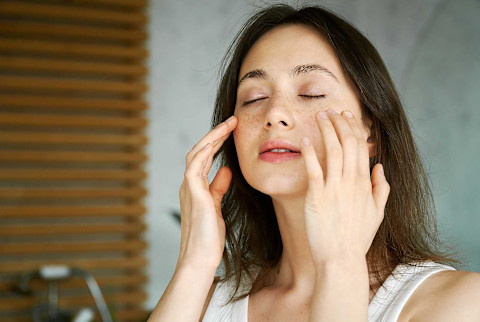An MD Explains Why Your Skin Looks Dull (& Why No One's Talking About It)

"Glowing skin" is quite the buzzword in the beauty space—so much so that it may have lost its true meaning. Because let me be clear: Glowing skin goes way beyond aesthetics.
Sure, you can create an instant faux glow with self-tanner or a touch of highlighter, but your skin also naturally has its own glow-inducing properties. And when your skin is so beautifully healthy, it quite literally shines.
Here's how to tap into your skin's natural glow system, the epitome of beauty science.
How your skin naturally makes light
"People forget that you have autofluorescence, so your skin literally makes light," says personalized medicine physician and leading biohacker Molly Maloof, M.D., author of The Spark Factor, on the mindbodygreen podcast.
That natural emission of light comes from the mitochondria, which are basically like your cellular batteries—they provide the energy needed for your entire body to function, including your skin cells.
Specifically, mitochondria are integral to your skin's collagen and elastin production process1, barrier function, wound healing, and overall vitality.
So when you tell someone, Wow, your skin is glowing! what you really mean is, Wow, your skin cells are full of energy and thus naturally radiate light! Doesn't have quite the same ring to it, does it?
What to do about it
So the question becomes: How do you optimize your mitochondria in the name of skin health? Maloof has plenty of biohacking tips to browse here, but when it comes to your skin care routine, you'll want to make sure you're consuming (and using) enough antioxidants.
"Using both oral and topical antioxidants can optimize cells to absorb oxygen radical waste," board-certified dermatologist Zenovia Gabriel, M.D., FAAD, once told mbg.
Some of our favorites include astaxanthin, which protects the skin's collagen layer and has been shown to help reduce fine lines and age spots; vitamin C, which helps support your natural production of collagen2 (it's also known for giving you that coveted, even glow); and CoQ10, which has been clinically shown to support skin elasticity and smoothness3 while combating wrinkles.
A little more info on the latter: Your cells actually need CoQ10 to produce energy4, and as CoQ10 decreases with age, so does mitochondrial activity and energy formation4. So if you're really serious about supercharging your mitochondria, you'll want to add the fat-soluble antioxidant to your rotation.
If you opt for supplements (highly suggest), just make sure you look for "ubiquinol" on the label, as that's the most bioavailable5, bioactive form of CoQ10 and has been clinically shown to increase CoQ10 levels6 in the body. Or you can just check out our curated list of beauty supplements—we did the legwork for you.
The takeaway
Want glowing skin? You have to take your mitochondrial health into account. It may sound more biology than beauty, but your mitochondria are responsible for the energy in all of your cells. And when your skin cells are full of natural zest, a brilliant complexion isn't too far behind.
